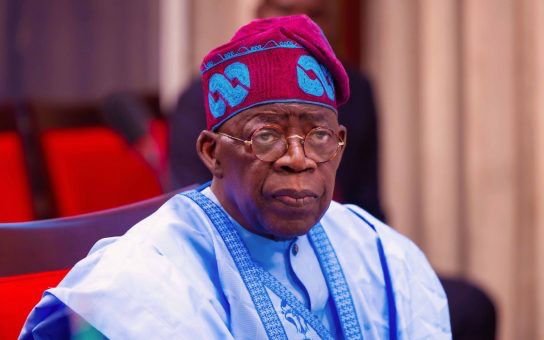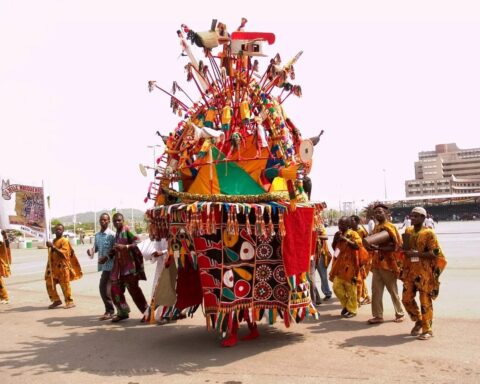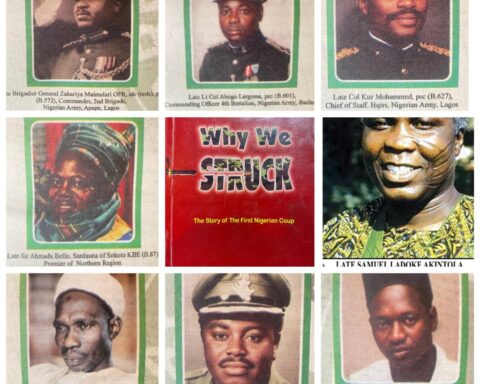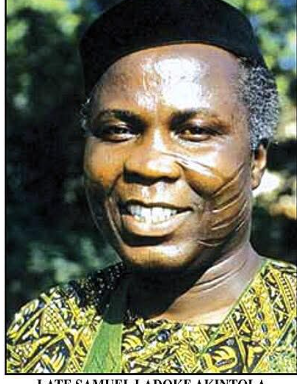Are Nigerians hungry because they’ve been drinking too much free beer and now the brewery is bankrupt? I ask because President Bola Ahmed Tinubu waxed rhetorical Thursday last week as he dissected the very bad hunger wracking his country and its more than 200 million people. “I understand we are hungry, but no free beer parlour anymore,” he said. Except the president is suggesting that we are a nation of drunkards, I am tempted to wonder what shred of meaning connects “hunger” and “beer” here.
What the president said was a rhetorical gaffe that deserves a rebuke. When a person says what he said and in the context he said it, the Yoruba would look at him and wonder why he is talking ìrù (tail) when we are talking irú (locust beans). What are we saying, what are they saying? We are begging for bread; they are belching beer. The old man saw liquid when his people cried solid. The president’s ‘learned’ supporters will insist that ‘beer’ is the president’s metaphorical substitute for ‘food’. That will be interesting. We’ve always suspected that metaphor serves as a ready refuge for the flawed – especially in the very slippery terrain of politics. But the Emilokan rationalists should remember to tell the president that a successful metaphor is one that is apt. When the vehicle and the topic cohere in semantic peace, we congratulate the metaphor birther for a successful delivery.
His preference for “beer parlour” where ‘food bank’ should be was a tragic subversion of aptness in metaphor deployment. A mandatory credit pass in Literature is recommended for whoever would be president after this one. ‘Beer’ does not collocate with ‘hunger’.
The beer-parlour talk of the president may be one of his lasting contributions to language and the field of political rhetoric. You never can tell. He already, during the 2023 campaigns, dropped ‘balablu’ as one of his hit singles. Sometimes, what the enemy thinks is blemish ends up embellishing one’s memory. We call it èébú d’olá in Yoruba. William Archibald Spooner lived between July 1844 and August 1930. Between those years, he served as a clergyman, author and professor of ancient history, divinity and philosophy at the University of Oxford. He was described as “a well-liked, respected, genial, kindly, hospitable man” but blessed with “a head too large for his body.” Spooner was brilliant but was equally very absent-minded, and he got famous for it. He, in 1879, from the pulpit, famously gave out the first line of a popular hymn as “Kinkering Kongs their titles take” (instead of ‘Conquering Kings Their Titles Take’). And he did it, not intentionally.
When Spooner died, his obituary in the 1 September, 1930 edition of Manchester Guardian contains this passage: “All sorts of stories, probable and improbable, were invented… Of the well-worn ones, the best are those which made Spooner declare that he was leaving Oxford by ‘the town drain,’ that some unauthorised person was ‘occupewing his pie,’ that at a marriage it was ‘kistomary to cuss the bride,’ and that he was tired of addressing ‘beery wenches.’ Much better authenticated and not even a Spoonerism is his famous reply to a young lady who asked him if he liked bananas. He is said to have retorted, ‘I’m afraid I always wear the old-fashioned nightshirt.'”
That Guardian obituary was not only how Spooner was remembered. Because he said all he said, before he died, the English Language got enriched with one more permanent word – spoonerism. The word proceeded to get a barge of honour as a rhetorical device in literature – and a mention in neuro science.
Who knows, courtesy of our president, ‘beer’ may enter the English Dictionary as a synonym for ‘food’ just as the president’s social media enemies, irreverent children of anger, use ‘agbadoan’ as a collective name for his long-suffering fans. Agbado is the Yoruba name for corn. The president, before his election, recommended it as a solution to the hunger on the streets.
Now, more seriously, let us ask the president and his defenders: Can beer replace dinner? Or could it be that we are hungry because our leaders have been taking too much freebies from our liquor bank? Or could it be that our president has been too far removed from the caked reality of the scorched earth for him to know that the world is about to end courtesy of his apocalyptic policies? When the president said what he said and ended it with a demand for patience from the hungry, I heard a loud applause from his fawning followers. The president enjoyed that applause. How I wish he would read Shakespeare in ‘Pericles: Prince of Tyre’. The playwright says: “They do abuse the king that flatter him.” He says again that “kings should let their ears hear their faults.” Clapping when the leader spoke beer when food was needed was distressing; it numbs the soul. But you would ask who made up that adulating audience? Former principal officers of the National Assembly. They are plaintive ex-eagles desirous of new feathers for fresh flights and feasts. They are men who are ready to kneel lower than their knees. A high-five for what the president said shames all – especially the eight million plus who elected him last year.
The president also spoke about “free bowl” which he said hungry Nigerians “cannot just take”. Then he spoke about the closure of Nigeria’s “free beer parlour”. The tone, texture and context of Tinubu’s beer-and-bowl statement trivialized the people’s travails. Who will help Nigerians tell their president that their hunger is not for beer and the inebriation it offers? That the starvation cries in town are not a craving for free meal. That Nigerians do not seek, and are not demanding indebtedness to charity. All they seek are policies with a human face, a government that cares.
The town writhes in agony because government has lost its meaning. Every citizen has a personal reason for voting in elections. One of those reasons is what English philosopher, Bernard Bosanquet (1848-1923) explains as the hope by the citizen that the government would help him to become “what he has in him to be.” Not all who voted for Tinubu last year did so for party, tribe or money. Some genuinely thought he would make a positive difference in their lives. Now, everyone is stranded because the government crashed the car.
The country is in deep trouble. What is broken in our economy is brittle beer bottle, not calabash. It cannot be mended as is done with calabash. It doesn’t look like the government is worried as we are about the present darkness. Where leaders do not care, we would be right to inquire what they have where a heart ought to be. If there is a heart there, then it must be made of something very hard. William Bascom wrote of the Yoruba concepts of the wicked and the hard-hearted: “A hard-hearted person is bad-tempered, easily offended, willful and stubborn, doing what he likes and paying no attention to what others say. When an ordinary person in anger would throw a small lump of dirt, a hard hearted person throws a large stone. Worse than the hard-hearted person is one who is ‘wicked’ (ìkà). A wicked person loves no one but himself; he advises others to sell things for less than he knows they are worth; he injures others and destroys their property without cause…” I agree. The wicked counts the number of stars he shoots down.
Last week, US vice president, Kamala Harris, told talk show host, Oprah Winfrey, that a leader’s real strength lies in “who he lifts up, not who he brings down.” She said the same, and much more, in another interview in April this year, long before she became the Democratic Party’s presidential candidate:
“We need a protector”, the interviewer told Kamala Harris.
And she replies:
“Yes. Sadly, over the last many years, there has been this kind of perverse approach to what strength looks like, which is to suggest that the measure of one’s strength is based on who you beat down instead of what we know that the true measure of your strength is based on who you lift up. You know, and if you ever want to measure, if you ever want some objective indication of your individual power, see what you can do to help other people, people in need. It could be some simple act, like just listening to how people are feeling and to sincerely, sincerely have some interest and concern about their well-being or their suffering. That’s what we want from leaders…That’s really what strength looks like and that’s the kind of strength that we want.”
That is the kind of strength Nigerians demand to see in their president. They do not desire a leader who sits somewhere far in the sky and speaks in tongues about hunger and patience; about beer, bowls and booze. A leader should not preen like a god while his people reel in pain.
We also read the president declaring last Friday that he was in government to work and not to make money. I read him and said great! A leader should take less and give more. “The less a man needs, the nearer he is to God who needs nothing,” said Socrates. But we read of our leaders’ stories of grasping and taking that leave us to wonder if some people’s needs have a limit.
About 50 years ago, Sakara music legend, Yusuf Olatunji, had cause to sing: “You said there is no food but your own children feed to satiation (E ní kò sí, kò sí, omo yín ńyó…).” Between the 1970s when the song was sung and now, what has changed is that things have grown worse. Our presidency is famed as the most powerful in the history of presidential democracy. It is also sadly, the most unfeeling. Ghanaian writer, Ayi Kwei Armah, asks: “Is it always true that it is impossible to have things strong and at the same time beautiful?” Our Federal Government is strong and powerful but so are wolves and lions in the jungle. We think our president should be king – or god – and we have him so invested. That should explain why a president says the wrong things and all palms turn zombie, clapping.
In a careless republic as ours, a president can easily become a virtual monarch, or even a god. We will soon be there – if we are not there already. It is possible some people have a shrine where they make offerings of kola and liquor to the Nigerian president. If they do, they would have several pages of history to guide them. One of them is in the West Africa magazine of March 3, 1945 which published a piece in celebration of the memory of an Alaafin who had just joined his ancestors. “The highest oath that an Oyo man could take was to swear by the head of the Alaafin,” the magazine wrote, and added that the people believed the late oba was divine. The oba himself thought himself so and he said so and acted so. How?
Eshugbayi Eleko was deposed as the Oba of Lagos in 1925 by the British. He was subsequently banished to Oyo town but he didn’t go quietly into the night; he went to court. During the ensuing celebrated case, evidence on some historical issues was needed in support of the deposed oba. It was to the Alaafin of Oyo that counsel to Oba Eshugbayi went.
The Alaafin was asked to swear before his evidence was taken.
Alaafin queried in anger:
“By whose name?”
“God’s name or by the name of your idol,” the lawyer told him.
“I myself am god!” the oba replied.
By calling himself god or God, the Alaafin of 1925 had not said what no one had ever said. About 300 years earlier, King James I of England uttered something weighty about the king occupying a throne almost as powerful as God’s. King James told the English parliament on Wednesday, 21 March, 1609 that “kings sit upon God’s throne, but even by God himself they are called gods.” A king, he said, could make anyone “beggars or rich at his pleasure; restrain, or banish out of his presence…” And he used that power, and faced resistance – from the Catholic Church and from other churches. He fought and won. He enjoyed exercising that divine right, quashing opposition, bringing people up, casting people down. But his son, Charles I, who succeeded him didn’t have the grace he had. History says Charles was fought, defeated, arrested, tried by a parliamentary court and found guilty of charges which included devising “a wicked design to erect and uphold in himself an unlimited and tyrannical power to rule according to his will, and to overthrow the rights and liberties of the people”. At his execution at about 2pm on Tuesday, 30 January, 1649, Charles insisted that he did no wrong, that the people were his subjects who should really have no “share in the government.” He stressed that “a subject and a sovereign are clean different things.” May God give Nigerians the sense to continue to have a share in their government.
(Nigerian Tribune)



























